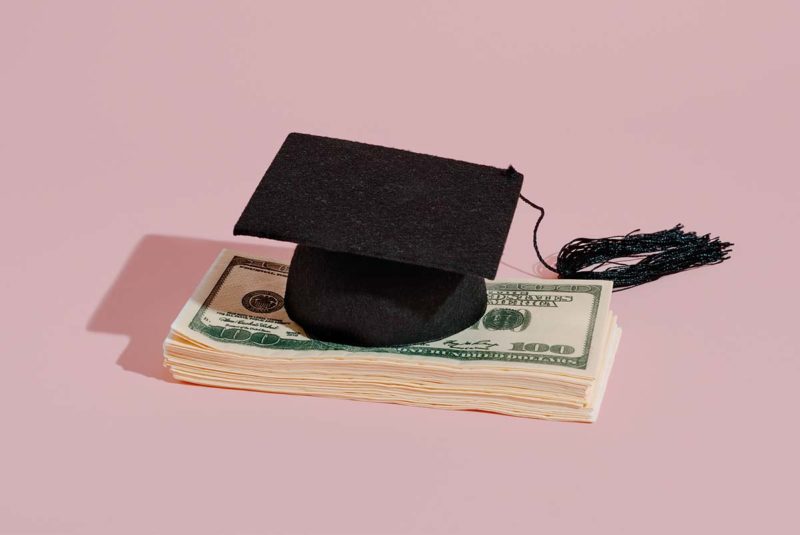If you have a student loan, you’re a member of a really, really big club. Over 40 million people have student loans to help with the expenses of higher education.[1]
But what does having student loan debt do to your credit score?
Student loans can make your credit score go down, but they can also make it go up. How your student loan influences your credit score depends on a variety of factors.
You don’t have to take a course to learn all about credit scores and how student loan debt can affect them. MoneyTips is here to give you a credit score primer with a simple syllabus: why your credit history is important, the factors that affect your credit score and how your student loan debt can affect your score. Then we’ll show you ways to improve your score.
Understanding Your Credit Score and Student Loans
When it comes to credit scores, it’s important to know how they are calculated and what factors affect them.
As for student loans, the more you know about the options, the more likely you are to pick the loan or combination of loans that is right for you.
What goes into a credit score?
First, what is a credit score? A credit score is a number between 300 – 800 lenders use to determine your creditworthiness. That is, it gives them a snapshot of how you pay back whatever money you borrow.
Data companies create credit scores. The score that most lenders use is from the Fair Isaac Corporation (FICO®). They calculate your credit score using information from your credit report, which is a compilation of your credit activity – like opening a credit card account or taking out a loan – and how timely you are in making the monthly payments.
You can think of a credit report as a financial report card that credit bureaus create. The three main credit bureaus are Equifax®, ExperianTM and TransUnion®.
Each lender will have its own gauge for what it considers a good credit score or bad credit score. A score of 670 or above is generally considered a good credit score. Bad credit or fair credit might be anything under that.
FICO® uses the following data, in these percentages, to come up with your FICO® credit score[2]:
- Payment History, 35%: Whether you make your payments on time and how often they are late.
- Credit Utilization, 30%: How much you’re using of the credit available to you.
- Length of Credit History, 15%: How long you’ve used credit.
- Credit Mix, 10%: The different types of credit you have, like installment credit and revolving credit.
- New Credit, 10%: The amount of your credit that’s new.
Types of student loans
There are two main types of student loans: federal and private.
Federal student loans are offered by the government to students, or their parents or guardians. Federal student loan options are:
- Direct subsidized Loans
- Direct unsubsidized Loans
- Parent PLUS Loans
- Graduate PLUS Loans
- Direct consolidation Loans
Private student loans are generally made available from a financial institution like a bank, credit union or online lender, or from school or agency. They include loans available to students or their parents or guardians.
When are student loans reported to credit bureaus?
Whether you have a federal student loan or a private student loan, creditors send updates about loan accounts to credit bureaus at different times.
It’s hard to know exactly when a credit bureau will know that you have taken out a student loan in the first place. But sometimes, it can happen within a few weeks of you getting the loan.
Late payments (often called delinquent payments) on federal student loans generally won’t be reported to credit bureaus until 90 days after the missed payment was due. This doesn’t mean you have a 90-day grace period to make your payment – it just means that any late payment probably won’t show up in your credit report until then.
How Student Loans Can Impact Your Credit Score
The impact student loans have on your credit depends on a number of factors, including what other credit accounts you have and how long you’ve used credit.
Do student loans make my credit score go up or down?
Student loan debt can have a negative effect on your credit, but it can also have a positive effect. As long as you keep making on-time payments, chances are your loan debt will actually have a positive impact on your credit.
How do you know whether your student loan debt will be good for your score or not so good? Just as any loan influences your credit, there are a number of ways that your score could be affected, both positively and negatively.
Can student loans positively impact my credit score?
Yes, it can. We’ve listed several ways having a student loan can be good for your credit score.
- Helping build credit through consistent monthly payments: Remember, payment history makes up 35% of your credit score[2], so continuously making each monthly payment on time is the single biggest way to raise your credit score. And lenders like to see a history of on-time loan payments.
- Ensuring a mix of credit: Credit mix is 10% of your credit score.[2] So, using different credit types, including revolving credit like a credit card, and installment credit like a student loan or car loan, will have a small but positive impact on your overall credit score.
- Lengthening your credit history: Having a student loan for many years will have a positive impact on your credit score, as the length of your credit history is 15% of your score.[2] At the same time, this can be something of a trade-off, as longer loan terms tend to mean you’ll pay more in interest overall than a loan that has a shorter time frame.
Can student loans harm my credit score?
Unfortunately, yes they can. But knowledge is power, so we’ve made a list of the main ways a student loan could harm your credit score so you can avoid these situations. We’ll talk about managing these situations in the next section.
- Delinquent payments: Just like making on-time loan payments or credit card payments can help your credit score, being delinquent on your monthly payments can hurt your score. Those late payments tend to stay on your credit report for 7 years[3], so a late student loan payment can have a lasting effect.
- Having additional loans, like a mortgage: Part of how lenders calculate your credit score is to look at your debt-to-income ratio (DTI). The DTI compares the amount of debt you owe (your “loan load”) each month to your gross monthly income. If you have both a student loan and a mortgage, they may think you are biting off more than you can chew, financially speaking, and downgrade your credit score.
- A temporary dip: It’s likely that when you’ve finished making student loan payments at the end of the loan, your credit may dip slightly. This is because the length of your credit history might be shortened, your credit mix may change, or your credit utilization may increase. But, the effect is temporary.
How To Manage Student Loans To Improve Your Credit Score
Want to ensure that your student loan debt has a positive effect on your credit score? We’ve got some steps for you to take, whether you have a federal or private education loan.
Making on-time payments
This is the single biggest action you can take to improve your credit score. Be sure to make each and every payment in full and on time every month.
For example, we mentioned earlier that having a mortgage and a student loan has the potential to drop your credit score. In that case, if you’re buying a house while repaying student loans, you can improve your credit score and your chances of getting a mortgage loan with lower interest by making loan payments on time.
Even if you have large loans, you will prove your creditworthiness and continue to enjoy a healthy credit score with a history of consistently making regular, on-time payments.
Setting up automatic payments
Chances are, your lender, loan servicer or financial institution has an easy way to set up automatic payments. Doing so will rid you of needing to remember to make your student loan payment each month. However, you’ll need to deposit enough money into the account the funds will be drawn from before the due date comes around.
Making sure your loan debt is structured for your situation
Be sure the student loan you take out has payment terms that are within your grasp. That way, you know you’ll be able to afford to pay it in full each and every month.
Exploring repayment plans
If you find that you’re having difficulty making payments on your student loan, it’s a good idea to explore a student loan repayment plan.
Ask your lender or loan servicer for details about a repayment plan that fits your circumstances, and be sure to ask about refinancing or other options to get back on track. Federal loans in particular have income-based repayment options, deferment plans and even loan forgiveness under certain circumstances.
Monitoring your credit report
Sometimes, mistakes end up on credit reports. But you won’t know if you’re not monitoring your report consistently. You can get a free credit report and information from the federal trade commission (FTC). Check it frequently and challenge any errors you find.
Student Loan Debt Isn’t a Credit Killer
In many cases, having a student loan is actually good for your credit score. But even if you don’t repay your student loans in full and on time, the sun will still rise in the east and you will survive.
Even if your credit score takes a hit, stay the course and take the steps you can to repair your score. Your “books” will be looking healthy in no time!
The Short Version
- Student loans can make your credit score go down, but they can also make it go up
- The impact student loans have on your credit depends on a number of factors, including what other credit accounts you have and how long you’ve used credit
- If you’re buying a house while repaying student loans, improve your credit score and your chances of getting a mortgage loan with lower interest by making loan payments on time
Education Data Initiative. “Student Loan Debt Statistics [2022]: Average + Total Debt.” Retrieved March 2022 from https://educationdata.org/student-loan-debt-statistics
FICO®. “What’s in my FICO® Scores?” Retrieved March 2022 from https://www.myfico.com/credit-education/whats-in-your-credit-score
Experian. “How long does negative information stay on my credit report?” Retrieved March 2022 from




